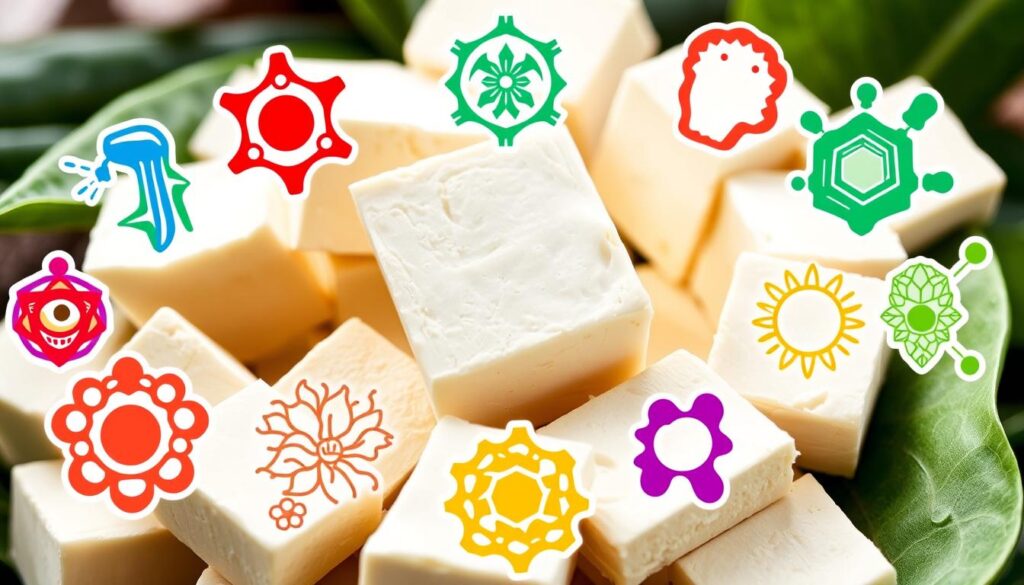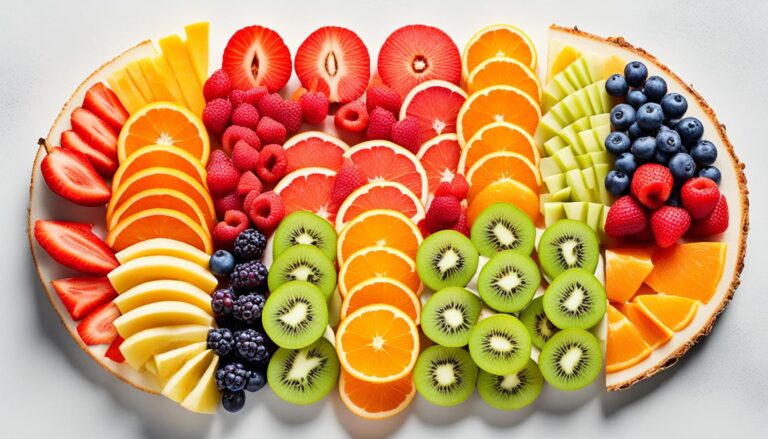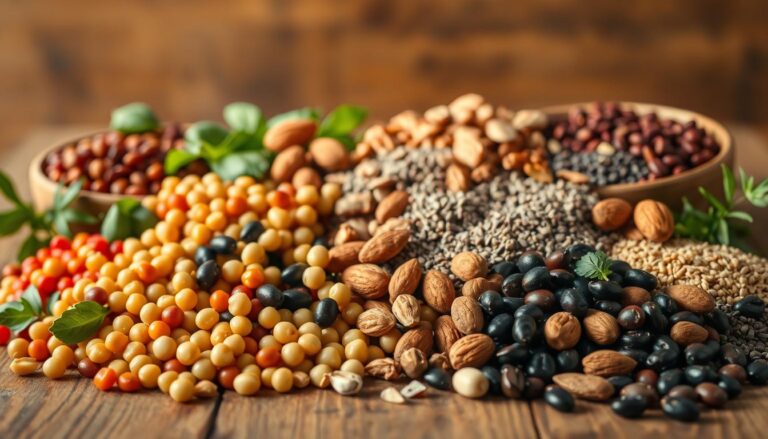Tofu a soy-based food is popular among vegetarians and vegans. It’s known for its nutritional value including essential amino acids and other important nutrients.
But is tofu really a good protein source? Let’s look into the facts and find out more about this soy food.
Key Takeaways
- Tofu is a nutrient-dense plant based protein source, providing 21.8 grams of protein per 0.5 cup serving.
- Federal dietary guidelines and the American Heart Association recognize tofu as a beneficial protein option for a healthy vegetarian or vegan diet.
- Consuming tofu at least once a week is associated with an 18% lower risk of heart disease compared to infrequent consumption.
- Tofu is rich in essential vitamins, minerals, and omega-3 fatty acids, making it a versatile and nutritious addition to a balanced diet.
- Ongoing research explores the potential cancer-preventive properties of the isoflavones found in tofu and other soy foods.
What is Tofu?
Definition and Origin of Tofu
Tofu, also known as bean curd, is a food made from soy milk. It’s pressed into blocks of different firmness. This protein rich food started in China around 200 B.C. and is now a key part of many Asian cuisines.
In the U.S., you’ll find tofu in various firmness levels. Silken tofu is soft and custard-like, while firmer types are more like soft cheese.
Tofu is made by coagulating soy milk and then pressing it into blocks. The coagulation can use different agents like nigari or lemon juice. The firmness of tofu depends on its water content with silken being the softest and extra firm the densest.
Tofu is great in many dishes, from stir-fries and soups to desserts and smoothies. Its mild taste and ability to take on flavors make it popular worldwide. Whether you like it silky firm or extra-firm, tofu is a healthy and easy addition to any meal.
Nutritional Profile of Tofu
Tofu is a nutritious plant-based food. It has a lot of essential nutrients. A half cup of firm tofu has 21.8 grams of protein, which is great for plant-based diets.
It’s also low in saturated fat and cholesterol. This makes it good for your heart.
Tofu is rich in vitamins and minerals. It has calcium, manganese, iron, and vitamin A. It also has soy isoflavones which may help with menopause symptoms and lower cancer risk.
| Nutrient | Amount per 0.5 cup 124g of Firm Tofu |
|---|---|
| Calories | 181 |
| Protein | 21.8g |
| Fat | 11g |
| Carbohydrates | 2.9g |
| Calcium | 861mg |
| Iron | 6.6mg |
| Magnesium | 53mg |
| Phosphorus | 281mg |
| Potassium | 223mg |
| Zinc | 1.9mg |
| Vitamin A | 2.5mcg |
| Vitamin B6 | 0.2mg |
| Vitamin C | 0mg |
Tofu is a nutrient dense food. It’s great for a balanced plant-based diet. Its versatility and nutritional value make it a favorite for those looking to boost their tofu nutrition, protein in tofu, vitamins and minerals in tofu, and soy nutrients.

Is Tofu a Good Source of Protein?
Yes, tofu is a great protein source. It’s made from soy milk and has 21.8 grams of protein in a 0.5 cup. This is perfect for vegetarians and vegans looking for protein.
Tofu is one of the best plant-based protein options. A 100g serving of steamed tofu has 73 calories, 8.1g of protein, and 0.7g of carbs. It’s also packed with calcium, iron, phosphorus, and magnesium.
Compared to other high protein foods like seitan and beans, tofu is special. It has all the essential amino acids. This makes it a great choice for adding plant-based protein to your diet.

If you’re vegetarian vegan, or just want more protein, tofu is a great pick. It’s easy to add to many dishes. Try it in stir-fries salads, smoothies, or baked goods.
Health Benefits of Tofu
Tofu is a nutritious soy-based food with many health benefits. It’s great for a balanced diet. It can help lower heart disease risk and may prevent some cancers.
Reduced Risk of Heart Disease
Studies show eating tofu regularly can lower heart disease risk by up to 18%. This is because tofu has soy isoflavones. These help lower cholesterol and protect the heart.
Potential Cancer-Preventive Properties
Tofu’s isoflavones and other compounds may prevent some cancers. This includes breast, prostate, and gut cancers. Places with more soy tend to have lower cancer rates.
Tofu is full of soy isoflavones for better health. It also has protein for body repair. It’s a complete protein with all essential amino acids.

Consuming the greatest amounts of isoflavones may lead to a systolic blood pressure reading that’s four points lower on average than those who consume the least. African Americans, in particular seem to benefit according to a study in the Journal of Clinical Hypertension.
Tofu also improves bone health brain function, and menopause symptoms. Its many benefits make it a great addition to a healthy diet.
Antinutrients in Tofu
Tofu is known for its nutrients, but it also has antinutrients. These compounds can block the body’s ability to absorb some minerals and nutrients.
Phyates in tofu can bind to minerals like iron and calcium. This makes it harder for the body to use these nutrients. Another issue is trypsin inhibitors, which can slow down protein digestion.
- Tofu contains 8 grams of protein, 2 grams of carbs 1 gram of fiber, and 4 grams of fat per 3.5-oz 100-gram serving.
- Sprouting soybeans before making tofu can reduce phytates by up to 56% and trypsin inhibitors by up to 81%, while increasing protein content by up to 13%.
Fortunately, you can lower these antinutrients by processing soybeans before making tofu. Fermented soy products like tempeh and miso tend to have lower antinutrient levels and higher nutrient bioavailability.

Antinutrients in tofu might seem like a problem, but they also have benefits. For instance, phytates can help control blood sugar and cholesterol in rodents. Also, protease inhibitors in soy have anti-inflammatory and immune boosting effects.
So, while tofu’s antinutrients are something to consider, they shouldn’t scare you off. By eating a variety of plant based foods and preparing tofu properly, you can enjoy its benefits without the drawbacks.
Isoflavones in Tofu
Tofu is a favorite plant-based protein and a key source of isoflavones. Isoflavones are compounds that act like estrogen in our bodies. But, research shows they don’t raise cancer risk or cause health issues, even in older women.
Studies suggest soy foods, like tofu, are good for us. Isoflavones may lower heart disease risk, fight cancer, and ease menopause symptoms. It’s key to eat tofu and soy in balance with other foods.
| Tofu Type | Calories | Total Fat | Protein | Calcium |
|---|---|---|---|---|
| Silken Tofu ⅕ package or 91g | 45 | 2g | 4g | 8% DV |
| Firm Tofu 3 oz. or 85g | 70 | 3.5g | 8g | 10% DV |
Silken tofu has fewer calories and fat than firm tofu. It’s a complete protein offering all essential amino acids. Pairing tofu with foods like avocados and quinoa makes for a nutritious meal.
The isoflavones in tofu are antioxidants and may ease menopause symptoms. Eating 1 to 2 servings of tofu daily is usually safe. Always talk to a doctor about your specific needs.
Neither soyfoods nor isoflavones warrant classification as endocrine disruptors.
In summary tofu’s isoflavones are not a worry. It’s a great addition to a healthy diet. Just remember to eat it in moderation and consult with a healthcare professional if needed.
Incorporating Tofu into Your Diet
Tofu is a versatile ingredient for many dishes. It has a neutral taste that absorbs flavors well. You can find tofu in various textures from soft to extra-firm. It’s great in soups, stir-fries, smoothies, and desserts.
To make tofu better press it first to remove water. Place it between heavy objects for 15-30 minutes. This makes it chewier, perfect for baking, grilling or frying.
For a quick tofu dish, bake cubed tofu with olive oil, tamari, and sriracha. Bake at 425°F until crispy. Then, add it to stir-fries, salads or Buddha bowls for extra protein.
| Tofu Nutrition Facts | Serving Size |
|---|---|
| Calories | 181 |
| Protein | 22 g |
| Carbohydrates | 4 g |
| Fiber | 3 g |
| Fat | 11 g |
| Calcium | 861 mg |
| Iron | 3 g |
| Potassium | 299 mg |
Start with 1-2 servings of tofu a day. Increase to 3-5 servings as you like. You can find tofu in most grocery stores, with Asian markets offering more varieties.
Adding tofu to your meals boosts plant-based protein and nutrition. Enjoy it in smoothies or stir-fries. The options are endless.
Conclusion
Tofu is a great source of plant-based protein and is very nutritious. It’s perfect for a balanced, vegetarian or vegan diet. It has high-quality protein essential vitamins, and minerals, and may offer health benefits.
Studies show tofu is rich in protein, just like animal-based proteins. It has a Protein Digestibility-Corrected Amino Acid Score PDCAAS that’s similar. Soybean protein, alone or with other proteins, has been studied a lot in humans and animals.
Eating tofu can help your health in many ways. It may lower heart disease risk, prevent cancer, and support bone health. Tofu is easy to use in many dishes, making it a great choice for a healthy diet.





